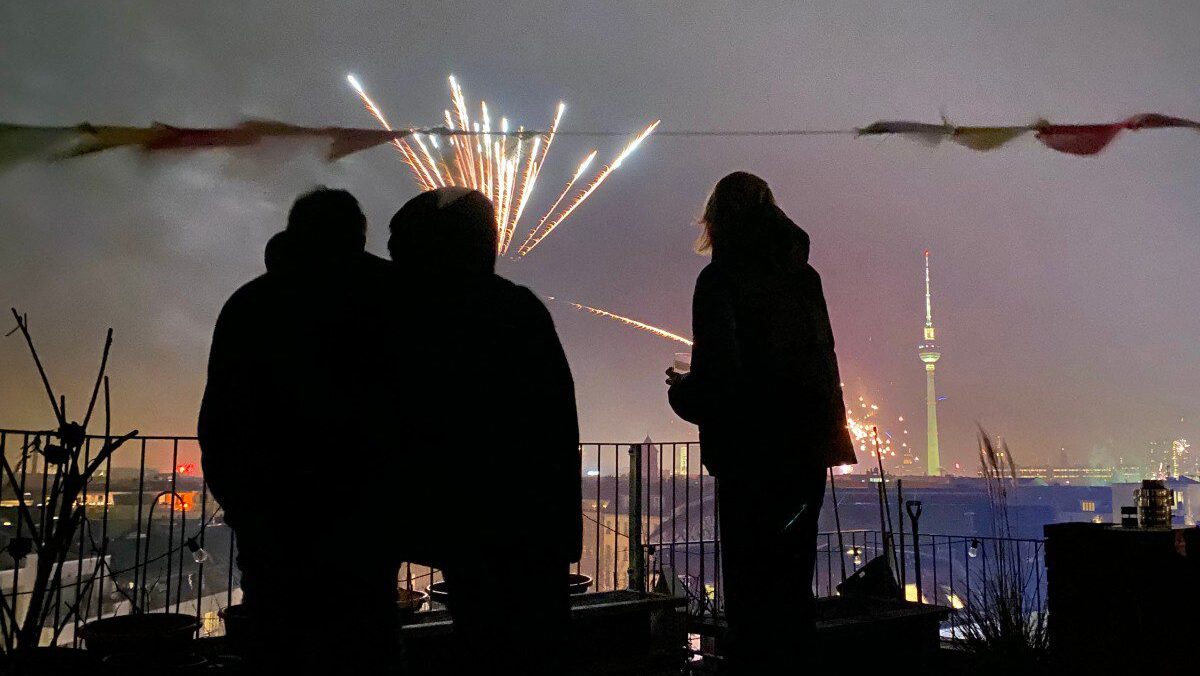
The landmark Television Tower (Fernsehturm) is seen in the background in Berlin, Germany on January 1, 2024 while people celebrate the New Year on the roof of a building, with fireworks exploding in the air.
Photo: by Barbara SAX / AFP
Conservative media outlets and social media users are outraged by New Year’s Eve attacks on the emergency services—mostly committed by young Muslim men—which authorities and politicians have hailed as a more peaceful “return to normal” when compared to last year.
Authorities in Berlin described New Year’s Eve celebrations in the German capital as more peaceful than in 2022. “Only” 390 people were detained and 54 police officers injured. After last year’s riots—when mainly young men of an African or Middle Eastern background targeted and attacked officers, firefighters, and medical personnel with fireworks—Berlin and other major cities were much better prepared.
As we reported, German municipalities planned to deploy many more police officers on Sunday in order to prevent the levels of violence seen the previous year.
“Many months of preparation by police and firefighters … have paid off,” Berlin’s Senator for Interior Affairs Iris Spranger boasted on social media platform X.
2/3 „vergleichsweise wenig Verletzte bei der Polizei. Es hat sich gezeigt, dass die monatelangen Vorbereitungen von @Berliner_Fw, @polizeiberlin und meinem Haus in Sachen Prävention und konsequenter Intervention aufgegangen sind…
— Senatsverwaltung für Inneres und Sport (@Innensenatorin) January 1, 2024
⬇️
Federal Interior Minister Nancy Faeser said it was clear that an increased police presence coupled with “an early crackdown” comprised “the right strategy against riots and violence.” A spokesman for the fire department referred to the situation in Berlin as a “normal New Year’s Eve.”
Though there may have been fewer injuries than last year, a leaked police report obtained by newspaper Bild reveals that emergency services had a tough night. In Berlin, for instance, large groups of young men deliberately targeted firemen, police officers and passers-by with pyrotechnics. Forced to wait for police protection, the fire brigade was at times prevented from extinguishing fires. Fire engines and police vehicles were also damaged. The situation was further complicated by a 2,000-person-strong pro-Palestinian demonstration on New Year’s Eve, where there were “chants against Israel and against the emergency services.”
A video posted on X by the daily Berliner Zeitung shows young migrant men shooting fireworks at other groups of people.
Am #Alexanderplatz beschießen sich junge Männer mit Raketen und zielen diese wohl auch absichtlich in Menschengruppen. #Silvester #Neujahr pic.twitter.com/oH6CN2h45w
— Berliner Zeitung (@berlinerzeitung) December 31, 2023
Police reports from other major cities paint a similar picture. In Frankfurt a police officer was attacked with fireworks by four people wearing masks. “One of the people was visibly carrying a knife,” according to a report, which called the situation “life-threatening.” The officer fired a warning shot into the air, and the perpetrators fled the scene of the crime.
In a separate incident, three arrests were made on Sunday in Cologne in connection with a plot to attack the city’s iconic cathedral. One suspect is a 25-year-old Tajik national, previously detained on Christmas Eve. Cologne police chief Johannes Hermanns told a news conference that they believed the perpetrators planned to strike on New Year’s Eve and that the “alleged means of attack” was a vehicle. Germany has been on high alert in recent weeks over possible Islamist attacks, prompted by the Israel-Hamas war.
Conservative publication Tichys Einblick delivered a scathing verdict on the situation, reminding its readers that “in order to prevent riots, the police and municipalities had made almost desperate, sometimes ridiculous appeals to rioters, violent criminals and extremists to be a little more peaceful on New Year’s Eve this time than last year.”
In Germany, the dominant left-wing forces in politics, science and culture are still preventing an open, fundamental discussion about the secret turning point in the country. Yet it has long since changed or strongly influenced the lives of almost everyone, in kindergartens and schools, in hospitals and prisons, in companies and universities. The connection between the growing propensity for violence in society and the uncontrolled migration of millions from the Islamic world also remains largely taboo,
the paper writes.
German-language Swiss daily Neue Zürcher Zeitung criticised German authorities for calling the events on New Year’s Eve “peaceful” and a “return to normal.” It declared that while no one “should have to get used to” this violence, “in Berlin … there is a tendency to reinterpret antisocial behaviour as a custom,” the paper writes, adding that the worst troublemakers “once again confirmed all the clichés. Most of them were boys and men from the Turkish-Arab milieu, who often identify well with Islam and less so with Germany.”
Another Swiss outlet, weekly magazine Die Weltwoche also drew parallels between increasing violence and the large influx of migrants:
Anti-Semitic slogans were also chanted again, and something else stands out every year: women are increasingly nowhere to be found on the streets of major German cities. Men without an appropriate migration background are also seen less and less often. … Anyone who bases the success or failure of a New Year’s Eve on the number of injured or arrested, and is satisfied if there are fewer than in the previous year, has not understood the real problem.
German and Swiss commentators are incredulous at the official verdict that New Year’s Eve violence in 2023 was kept down to acceptable levels. Attacks on the emergency services being treated as the “new normal” bodes ill for 2024.
